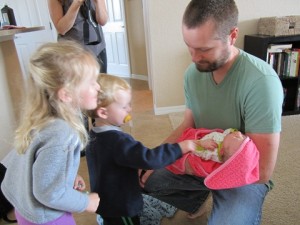When a new baby comes to a family, preschool siblings are curious, wanting to touch, kiss, hold, and interact with this novel and interesting little bundle. Cameras click and parents are thrilled with the initial enthusiasm. But after several weeks, even the littlest big brother or sister begins to catch on.
Baby-cakes isn’t going away.
As a matter of fact, by taking up permanent residency, the baby has caused older siblings to be demoted. This new little person takes over Mommy completely and seems to be the only thing on her mind: “Talk quietly… Baby’s sleeping… Touch gently… That’s enough for now… Be careful…”
Mommy and Daddy ask, “Isn’t the baby wonderful?” while older children think, “How can we get rid of it.”
The children quickly learn the only way to stay on everybody’s good side is to fake a love for the baby, which most toddlers and preschoolers do well, at least for a while. Their heart isn’t in it, though, evidenced by kisses accompanied by too-tight squeezes and pats that closely resemble hits.
If we’re honest, we have to say that sometimes we view God in a similar way, as an intrusion in our lives. We know the relationship should be one of genuine love and devotion, but accepting him as he is can often feel like heavy pressure.
So we approach him in prayer and say the right words, but our hearts aren’t in it. We sit in church pretending to listen but sneak frequent peeks at our watches. We attend Bible study but tune out when we recognize what’s being taught and think we already know it.
Believers sometimes go through periods of complacency during which they feel far from God. Since he doesn’t leave us, the estrangement must be on our part. That doesn’t stop us from blaming him, however, if our prayers seem unheard and our spiritual vitality grows parched.
When a new baby arrives, parents insist the other children accept him, but God isn’t like that. He doesn’t force us to do anything we don’t want to do and won’t come into our lives at all unless personally invited. That means there’s no valid reason to feel negatively toward him. If we want him, he says we can have him, and if we don’t, we shouldn’t complain about being without him.
The Lord is always honest with us and wants us to be the same with him. It’s a relief to know there’s no need for pretense or for faking love. We aren’t preschoolers trying to act as if we adore a new baby. We’re grown-ups, and it’s up to us whether or not we want to love God.
And if we decide to love him, I’m fairly sure there’s no way to overdo it.
“There is no God like you in all of heaven above or on the earth below. You keep your covenant and show unfailing love to all who walk before you in wholehearted devotion.” (1 Kings 8:23)





